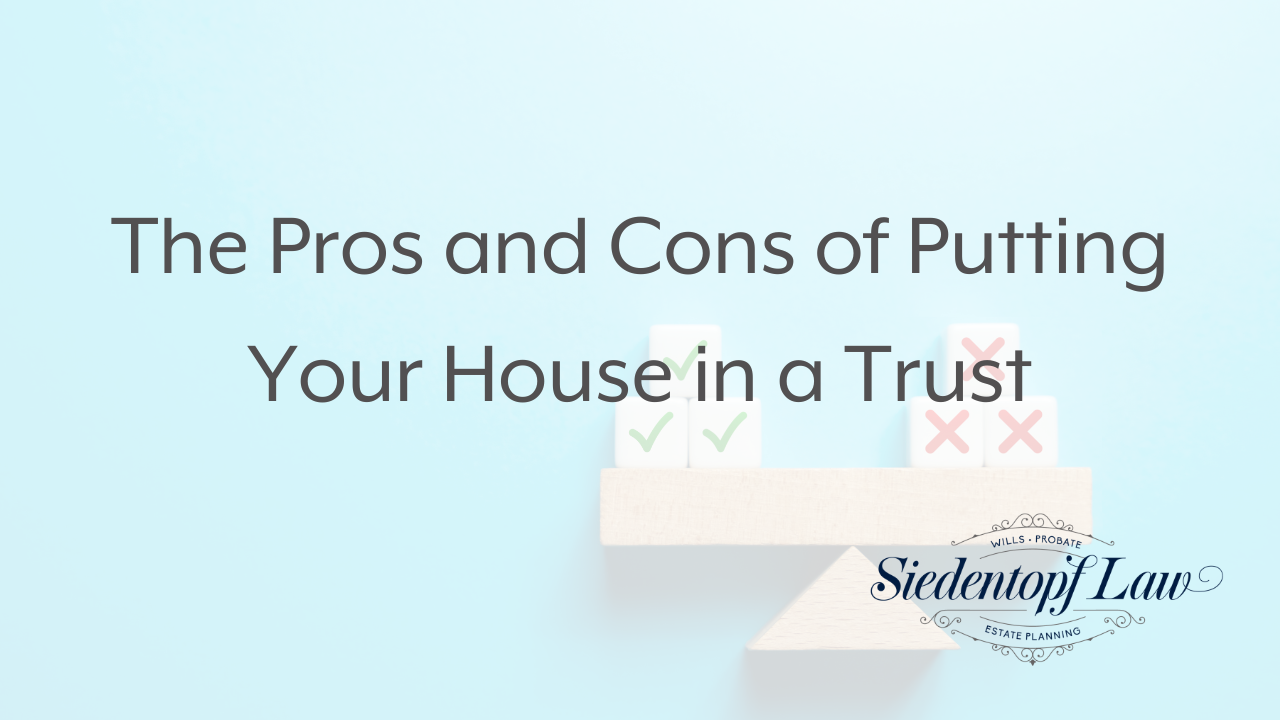Much talk is heard today about the advantages of putting your house in a trust. Is there a prevailing benefit to having your home in a trust? How does it benefit you and your heirs? Are there any drawbacks? If I have my home in a trust, do I still need a Will? We will try to sort out these issues for you in an understandable and easy to follow way.
Why would I want to put my house in a trust?
The first and most common reason for putting your house in a trust is to avoid probate.
Probate is a time consuming and sometimes expensive prospect and the ability to exempt your house from the process can be a real benefit. Probate can vastly slow down your beneficiaries’ ability to utilize or sell the property. Since for many their home is the major part of their estate, inability to access this asset can be a serious negative for your family. You will have added fees generated by the need to pay for drafting a deed to transfer the property.
Learn more about the process of probate.
Secondly, there is a great benefit to your beneficiaries in avoiding capital gains taxes.
Often older people want to give their property to their children while they are still living so they can move on to enjoy their retirement. In theory, this seems to make sense. Your children have families of their own and need a larger home, whereas your house is now too big for you, and ties you down to more responsibility than you want to deal with. However, if you gift your property to your children during your lifetime, they do not receive a step up in basis. This means that should they need to sell the property, there could potentially be a large capital gains tax that benefits no one, not to mention the need to file a gift tax return. If, however, you place your property in a trust, your children can still enjoy the larger home and you can go off and enjoy your later years, but the title to the property does not transfer until your death, and your children receive a step up in basis and avoid a potentially huge tax bill.
Third, you can put multiple properties in the same trust.
If you own more than one home or other real estate, you do not need to have a separate trust drawn up for each property. Multiple properties, and other assets as well, can be placed in a single trust and be handled by the same trustee.
A fourth consideration is privacy.
Probate is a public process. Your estate and its value are available for all to see. Trusts are private and will not be available for the public to scrutinize.
Fifth, it can protect your assets.
Depending on the type of trust you create, placing your home in trust can effectively reduce the value of your estate, allowing you to qualify for Medicaid assistance and asset protection should you need it. Not all types of trusts will accomplish this outcome, so if this is one of your concerns, be sure to talk to your estate planning professional about it in detail.
Learn more about the different types of trusts here.
Lastly, trusts can offer more flexibility.
If you have a revocable living trust, you can add or remove assets from the trust as long as you are in control of it. You can sell your home and buy another, or place newly acquired properties into the trust. You can even dissolve the trust altogether. (Of course, if you do, you will lose the benefits the trust offered you.) A revocable living trust becomes irrevocable when you die, so the terms cannot be changed by anyone after your death. A will is much less flexible to change and often would require a complete re-write or a codicil should a change be needed.
What are the downsides of putting my house in a trust?
The first consideration is cost.
The costs involved with creating a trust, and the continued cost of maintaining that trust, are usually significantly higher than just drawing up a Will. In addition, depending on the makeup of your estate, you will likely also want to have a Will created to deal with other aspects of your estate, so you will have that cost as well. This is especially true if you have minor children (or pets) to consider. You will need to provide for the continued care and support of your charges, and that is normally handled in your Will.
Secondly, trusts are extra work on the front end.
Getting things set up and transferred takes more work and expense on the front end rather than leaving it to other people to do the work after you die.
Third, other assets might still go through probate.
Although assets placed in trust avoid the probate process, anything that was not transferred to the trust may still need to go through probate. It is important to make sure the transfers are done correctly to avoid having assets that must go through the probate process.
So how do I decide?
The bottom line is, your decision to choose a trust as part of your estate planning depends on your goals. The details can be complex and your best plan is to work with an expert estate planning professional like those at Siedentopf Law.
Call Siedentopf Law today, or set up an appointment online to begin or review your estate plan!








